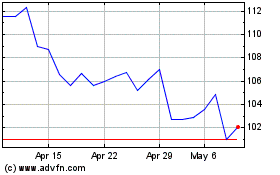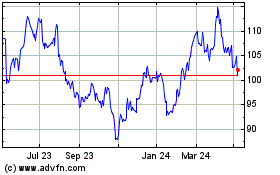By Tom Fairless
FRANKFURT -- Coronavirus infections are rampant in Germany but
most of the country's factories are still humming, sketching a
blueprint for countries seeking to support economic activity
through the pandemic.
Nonessential businesses sit idle across swaths of Europe, and
attempts by manufacturers in the U.S. to keep plants open have
caused tensions with workers. Germany could show the way for badly
hit countries like Italy, which are considering how to restart
production when the worst of the crisis has passed.
German factories were quick to get workers on board, and to
impose strict cleanliness measures and organizational rules, often
imported from their operations in China. In some cases, they
brought in their own medical staff.
Keeping plants running isn't important only to protect jobs and
soften the economic shock caused by the closures of entire sectors.
Executives say it is also a matter of survival for individual
businesses.
"[It] is important for various reasons: customer relations,
supply chains, but also worker relations," said Andreas Peichl, an
economist with the Ifo think tank in Munich.
German manufacturers are running at as much as 80% capacity,
according to estimates from bankers, economists, and industry
representatives. Manufacturing in France and the U.K. contracted
much more sharply in March than it did in Germany, according to
surveys of business managers published on Wednesday by Markit.
Exactly how many factories are open is unclear. Flagship auto
makers like Volkswagen AG and BMW AG closed their German plants in
recent weeks. Yet in other sectors, these people say closures are
the exception, even though few plants are running at full
capacity.
Closures "are not a phenomenon widely spread among our 3,300
member companies," said Holger Paul, a spokesman for the German
Mechanical Engineering Industry Association, a trade body.
Many plants may eventually have to close if the lockdown extends
for much longer, further depressing demand in Europe and cutting
off crucial international supplies; or if more workers become
infected, forcing authorities to clamp down. But for now, a solid
backlog of orders and a nascent rebound in demand from China means
it makes sense for many businesses to maintain some activity.
To limit the risks, executives say they moved early to implement
hygiene measures first introduced at their operations in China,
where even smaller German companies frequently invest. Now they are
introducing these measures in their U.S. factories.
In February, when the coronavirus still seemed a distant threat
to Americans and Europeans, ebm-papst Group -- which makes electric
motors and fans -- started adopting such practices globally, said
its chief executive Stefan Brandl. These included measures to
restrict travel and gatherings of staff, and to encourage managers
to work from home.
In the U.S., where the company has around 400 staff at factories
in Connecticut and Tennessee, workers wear face masks, and
social-distancing measures such as staggered shift times help to
minimize contact.
In Germany, no visitors are permitted, and teams of cleaners
sterilize doorknobs, machine handles and other equipment around the
clock. Break rooms are organized so that workers don't have to
stand next to each other. Management staff alternate between
working at the office and from home. In-house doctors administer
coronavirus tests to at-risk workers.
Kion Group AG, which builds forklift trucks and warehouse
equipment, is still producing at its German factories despite
disruptions in its international supply chains, chief executive
Gordon Riske said.
The company, which has five factories and around 4,000 employees
in China, set up a crisis team early this year to develop health
and safety strategies that it later applied in Europe, Mr. Riske
said. Measures included removing workstations to increase distances
between staff.
"It's extremely important to keep factories running. Perhaps
this won't go away so quickly," Mr. Riske said.
Robert Schullan, chief executive officer of HAWE Hydraulik SE, a
Munich-based manufacturer of hydraulic pumps and valves, says new
working methods mean the company is operating its six German plants
at near 100% capacity. It is now working through a backlog of
orders, and receiving new requests, mainly from Asia.
Among other measures, the company has created new shift patterns
to ensure the same workers always work together. A minimum distance
of 1.5 meters between workers is closely monitored by medical staff
and management, Mr. Schullan said.
"Our international customers are requesting proper supply," he
added.
At chemicals giant BASF, factory staff are provided with
contactless delivery and pickup services for catering, said
Christian Zeintl, a spokesman.
Germany's corporate governance system, which gives workers a
strong say in management decisions, has helped keep staff and
unions on board.
"The protection of the health of employees is the highest
priority, [but] not all activities can be done from home," said a
spokesman for IG Metall, an industrial union with more than two
million members.
Oliver Simon, a factory worker and employee representative at
engineering group Robert Bosch GmbH said some workers were
concerned about reporting back to work in the thick of the
pandemic. But they also saw the benefits of keeping factories
running, he said.
He estimated that around half of staff are currently at work in
Bosch's local factories in the west German Saarland region, which
manufacture car parts. Other staff are tapping short-time work
programs.
Businesses are also wrestling with stalled global trade and a
devastating decline in demand for consumer goods such as cars. A
shortage of parts from international partners could force some
businesses to mothball plants unless Europe's strict isolation
measures start lifting in coming weeks.
European aircraft manufacturer Airbus SE, which has large
factories in the U.K., France, Germany and Spain, is operating its
factory in northern Germany only four days a week because it is
reliant on parts from the U.K., said Justin Dubon, an Airbus
spokesman.
Like others, ebm-papst has sought to adapt to the new reality by
shifting to ventilators and other medical products after a crunch
in supply and demand for its fans and motors used in cars, Mr.
Brandl said.
The company's German factories are running at 80% capacity, and
it has yet to ask production workers to work shorter hours, Mr.
Brandl said. It has increased its ventilator-building capacity by
50% despite shortages of supplies.
HAWE Hydraulik is conducting virtual fairs to advertise its
products, and focusing more strongly on the medical and
renewable-energy sectors.
Economists say manufacturers are generally better equipped than
services companies to stomach a lull in activity because they can
work overtime to produce goods that customers have put off buying
but will need in the future. Hotels and restaurants can't recoup
lost business in the same way.
Still, each week of shutdown costs the German economy around 1%
of gross domestic product, or about $40 billion, said Lars Feld,
chairman of the Council of Economic Experts that advises the German
government. Even well-funded manufacturers would struggle to
survive an extended lockdown.
"We cannot afford a shutdown beyond May," Mr. Feld said.
--William Boston contributed to this article.
Write to Tom Fairless at tom.fairless@wsj.com
(END) Dow Jones Newswires
April 03, 2020 05:45 ET (09:45 GMT)
Copyright (c) 2020 Dow Jones & Company, Inc.
Bayerische Motoren Werke (TG:BMW)
Historical Stock Chart
From Mar 2024 to Apr 2024

Bayerische Motoren Werke (TG:BMW)
Historical Stock Chart
From Apr 2023 to Apr 2024
